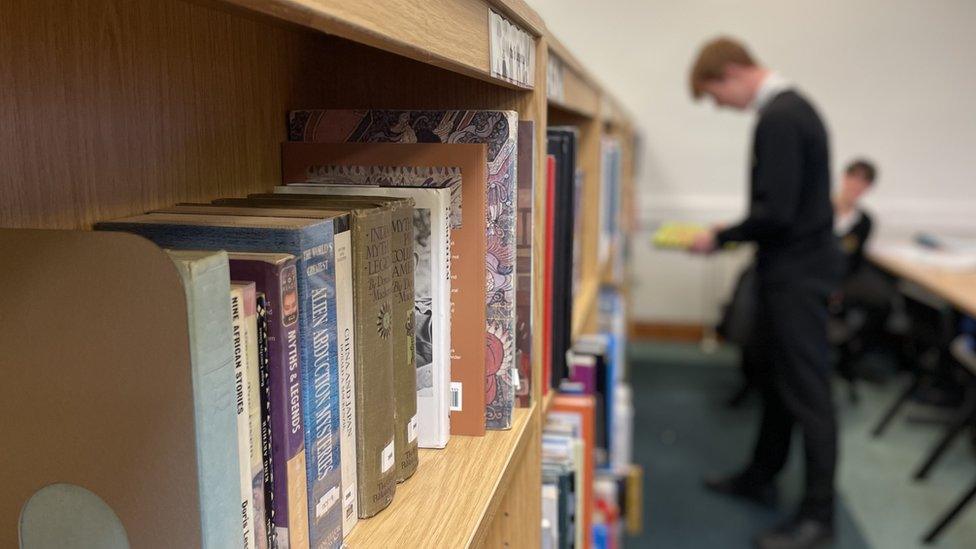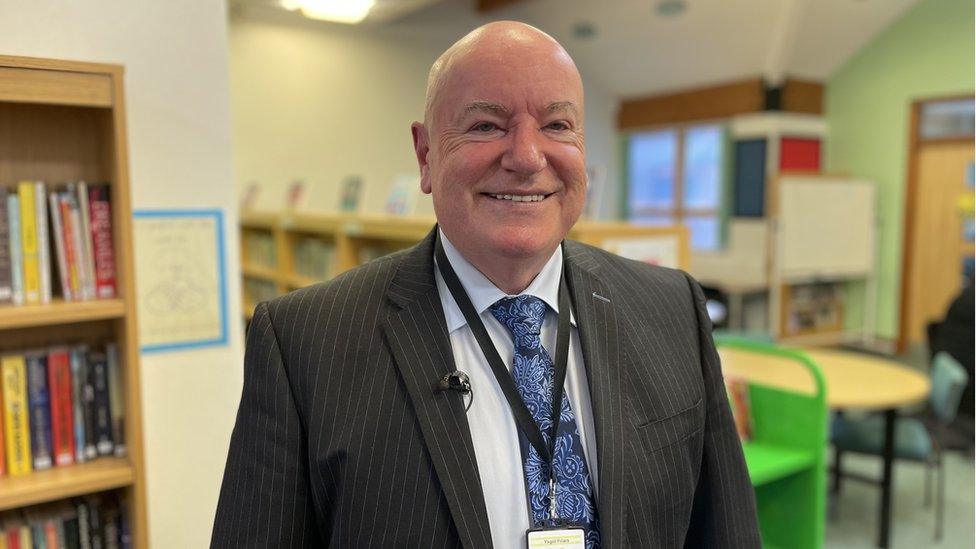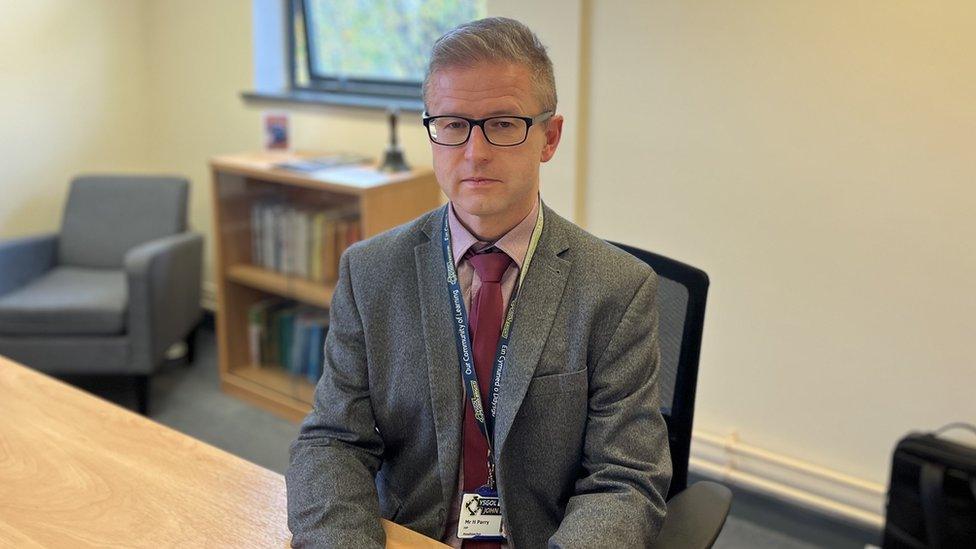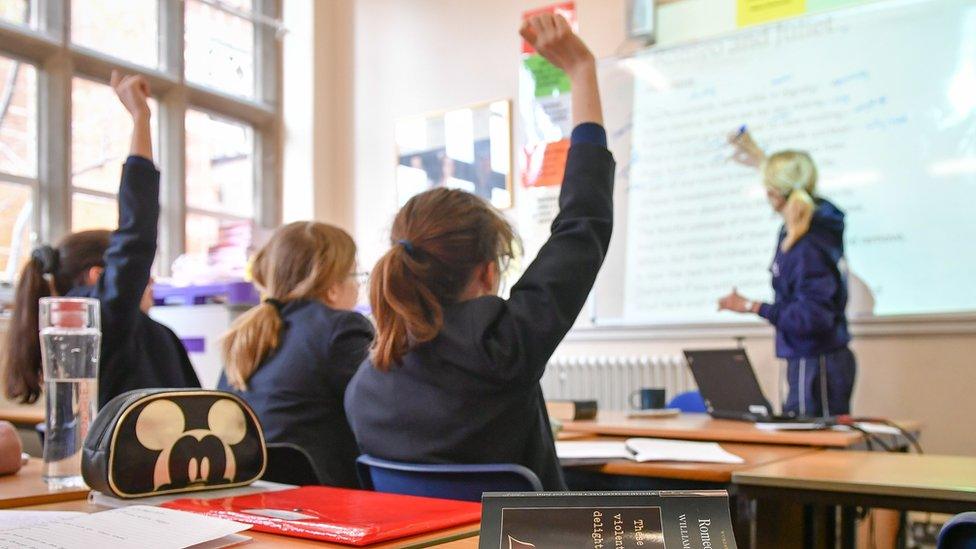Cost of living: Schools with healthy reserves face budget pressure
- Published

Many schools in Wales carried over big budget surpluses into this financial year due to the pandemic, but there are fears they will quickly evaporate
Higher electricity bills and finding the cash for staff pay is still a worry for a school with a million-pound buffer, its head teacher has said.
Ysgol Friars, in Bangor, Gwynedd, carried over £974,000 from last year as figures show the pandemic left school reserves up across Wales.
One union called the figures a "smoke screen" because most reserves are ring-fenced for specific projects.
The Welsh government said it recognised the pressure on public services.
A recent survey of head teachers has suggested pressures on school budgets could mean staff cuts across Wales.
The head of Ysgol Friars, Neil Foden, said the 1,400-pupil secondary school had seen its electricity bill double.
"That's going to cost us probably between £45,000 and £50,000 in this financial year with a significant increase on that in the following financial year," Mr Foden said.
The cost of just about everything - from maintenance work to photocopier paper - has gone up, he said.
But he said his biggest concern was where the money would come from to pay a 5% increase in teachers' salaries and other staff pay.
Salaries take up about 80 to 85% of the overall school budget.
The education minister told BBC Wales the additional reserves schools had accrued over the Covid pandemic could help some meet the pay settlement for teachers.
He added this was not the case for all schools and he recognised it was variable across the system.
A spokesperson for the NASUWT teaching union said it was "simply not good enough" for the Welsh government to claim its hands were tied, and to attempt to shift the responsibility for funding the investment in teaching on to the UK government.
It added there could be a "very real" prospect of industrial action in the new year.
The director of Association of School and College Leaders (ASCL) Cymru, Eithne Hughes, described the 5% rise as "derisory" and said it could lead to redundancy of teachers and larger class sizes for pupils.
A union has warned of potential redundancies, something Mr Foden has ruled out for his school.
But he said he anticipated difficult decisions for some schools long-term.
"I wouldn't be at all surprised if, at the end of the 2023-2024 academic year, there will be schools shedding staff, both teaching and non-teaching," he said.

Head teacher Neil Foden says schools in Wales are facing difficult decisions
Ysgol Friars is one of almost 1,000 schools in Wales that had reserves in excess of 10% of their expenditure at the end of March 2022.
Overall, schools had reserves of £301m, the equivalent of £659 per pupil, up from £32m in 2019-20.
Mr Foden said rolling over almost a million pounds into this financial year was "absolutely unheard of for us".
"In normal circumstances a balance that size, you wouldn't even dream of having it," he said.
Partly a quirk of the pandemic, schools spent less on bills during closures and got a refund when exams were cancelled.
On top of that, extra grant money from the Welsh government given late in the financial year also boosted budgets.
"But it's already gone down," Mr Foden said, explaining how refurbishing the school library and employing counsellors to address increased demand for mental health support since the pandemic had put a big dent in cash.

The library at Ysgol Friars was recently refurbished, putting a "dent" in school funds
The head teacher believes reserves could help as a short term "financial cushion" for schools facing higher costs.
But 44 of the 1,479 schools in Wales started the financial year in the red.
The Association of School and College Leaders said reserves were mainly made up of money for specific projects, not for ongoing costs such as covering salaries.
Eithne Hughes, the union's director in Wales, said it was "a poor state of affairs" if funds earmarked for Covid recovery were used to "prop up the whole education system".
She called it "a smoke-screen to hide the fact we have got a real and significant problem for funding in our schools".

Eithne Hughes, of the Association of School and College Leaders, calls school reserves a "smoke-screen" for funding problems
"Some of the things they will be doing is they'll be looking to cut staffing, and as soon as they cut staffing those class sizes are going to be larger," she said.
"I'm hearing of some schools where those class sizes will be up to 38 at secondary school level.
"Now that is just untenable."
A recent survey by head teachers' union NAHT Cymru suggested many of its members were looking at staffing cuts.
Hywel Parry, head of Ysgol John Bright secondary school in Llandudno, Conwy county, said financial planning is difficult when there was so much uncertainty about energy bills and other costs.

Hywel Parry, head of Ysgol John Bright, says his schools is facing potentially catastrophic budget cuts
"We're now looking at potentially catastrophic budget cuts," he said.
"At what stage are we unable to continue to provide a safe education for learners under the types of cuts that are being proposed.
"It just adds to that impending sense of doom."
Hugo Hutchison, head teacher at 1,700-pupil Monmouth Comprehensive School, said school leaders were concerned about the warnings they were hearing about cuts.
"We've put a huge amount of investment into well-being support - the recovery out of the pandemic and looking after students' mental health and wellbeing, as well as that of staff," he said.
"That provision wouldn't be able to be afforded by any school if we had the level of cuts that are being discussed at the moment."

Hugo Hutchison, head of Monmouth Comprehensive School, says he is worried about money needed to help education recover from the pandemic
The Welsh government said it recognised the financial pressures inflation and energy costs placed on public services, and called for more funding from the UK government.
A spokesman added "overall school budget reserves remain very high", and that it would support local authorities and schools in deploying them.
- Published17 November 2022

- Published1 November 2022

- Published28 October 2022

- Published25 September 2022

- Published18 July 2022
